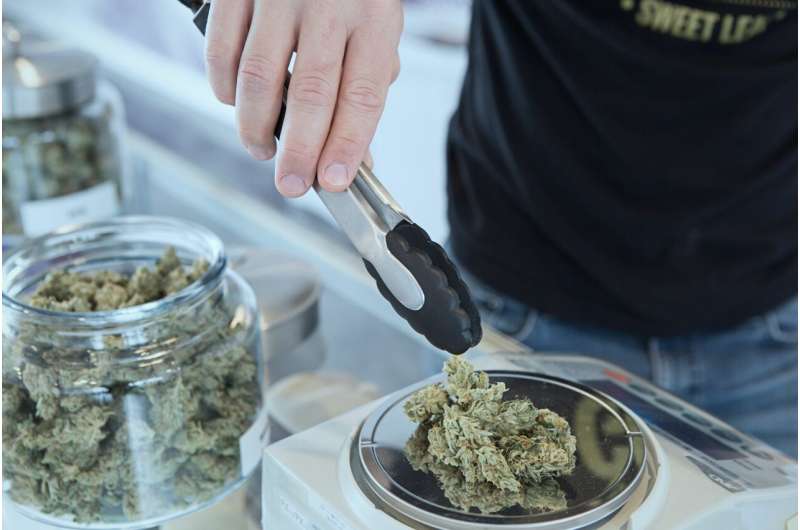This article has been reviewed according to Science X's editorial process and policies. Editors have highlighted the following attributes while ensuring the content's credibility:
fact-checked
trusted source
proofread
Upending conventional wisdom, researchers say cannabis use doesn't hinder PTSD therapy

Despite the risks associated with self-medicating for mental health issues, cannabis use may not be as disruptive to typical posttraumatic stress disorder (PTSD) therapy as once assumed, a Rutgers study has found.
"Some providers believe cannabis use impedes PTSD treatment, and that cannabis use while in PTSD therapy could increase drop-out rates and exacerbate symptoms," said Tanya C. Saraiya, an assistant professor at the Rutgers Graduate School of Applied and Professional Psychology and co-author of the study published in the Journal of Anxiety Disorders. "Our findings challenge this assumption."
As rates of posttraumatic stress climb in the wake of the COVID-19 pandemic, many Americans are turning to cannabis—both medical and recreational—and other substances to cope. Amid this increase in self-medication, psychologists are keen to understand how people with both substance-use disorders and PTSD diagnoses respond to two forms of treatment: trauma-focused and non-trauma-focused.
In trauma-focused treatment, patients are guided to examine the root causes of their suffering by talking about the traumas they experienced through talk therapy. Non-trauma-focused approaches—such as relaxation techniques—seek to reduce PTSD symptoms but not by directly talking about the traumas or addressing the feelings related to the traumatic event.
To understand the relationship between treatment type, cannabis use and outcomes, Saraiya and colleagues from the University of California San Diego compared therapy responses among people with PTSD and substance use disorders who were also using cannabis.
Data was drawn from Project Harmony, a 36 study meta-analysis of individual patient data from national randomized clinical trials. Denise Hien, senior vice provost for research at Rutgers-New Brunswick and director of the Center of Alcohol and Substance Use Studies, serves as the principal investigator for Project Harmony and co-authored the study.
"Integrated data science projects such as Project Harmony allow us to leverage existing clinical trials for particular populations, such as for those with PTSD who use cannabis during treatment—bringing new insights to the field," said Hien.
Using responses from four of the studies included in Project Harmony, researchers measured PTSD severity, alcohol use and non-cannabis narcotic use before, during and after treatment. Participants were grouped by treatment type and whether they reported using cannabis in the previous 30 days.
Researchers determined that people using cannabis at the start of therapy benefited from PTSD treatment. Participants in both cannabis groups—use and nonuse—also achieved significantly greater reductions in PTSD symptoms when receiving trauma-focused treatment versus non-trauma-focused, reinforcing the view that trauma-focused treatments are more effective.
Saraiya said the findings could help settle debate within the profession about the benefits of PTSD therapy for individuals with substance use disorders and using cannabis. She also said this study and future ones may help reduce the prejudice some PTSD patients experience when they turn to cannabis, particularly veterans reliant on government health care.
For instance, the Department of Veterans Affairs prohibits its providers from prescribing medical marijuana. By contrast, 38 states, three territories and the District of Columbia permit the medical use of cannabis products.
The researchers said these findings shouldn't be interpreted as a green-light to light up, adding that it's still essential for health care providers to assess and discuss cannabis use with patients to ensure it doesn't interfere with optimal treatment or impair functioning outside the context of PTSD.
For Saraiya, the important message is that people suffering trauma shouldn't be penalized or ostracized for trying to self-medicate.
"You should not be denied trauma treatment if you have a substance-use disorder and PTSD," she said. "You should be provided trauma therapy even if you are coping with cannabis or other substances. We now have years of evidence showing that when you get the best treatment, which focuses on the trauma, you do well. This holds true even if you use cannabis."
More information: Melanie L. Hill et al, Cannabis use and trauma-focused treatment for co-occurring posttraumatic stress disorder and substance use disorders: A meta-analysis of individual patient data, Journal of Anxiety Disorders (2024). DOI: 10.1016/j.janxdis.2024.102827


















